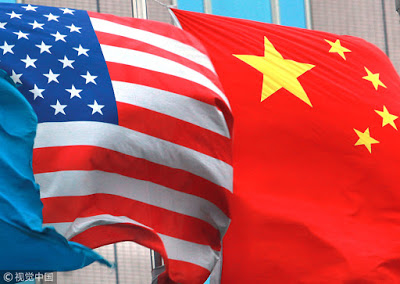In what appears to be an extension of
trade war, President Donald Trump has hit Africa’s smallest country,
Rwanda, suspending duty-free treatment for apparel products from the
country.
trade war, President Donald Trump has hit Africa’s smallest country,
Rwanda, suspending duty-free treatment for apparel products from the
country.
The duty-free benefits for Rwanda were
part of the African Growth and Opportunity Act (AGOA), a free trade
agreement between the EAC and the US.
part of the African Growth and Opportunity Act (AGOA), a free trade
agreement between the EAC and the US.
After Rwanda increased the import tariffs
for used textiles, the American Secondary Materials and Recycled
Textiles Association filed a petition lobbying an AGOA eligibility
review, arguing the ban “imposed significant hardship”
on the US used clothing industry.
for used textiles, the American Secondary Materials and Recycled
Textiles Association filed a petition lobbying an AGOA eligibility
review, arguing the ban “imposed significant hardship”
on the US used clothing industry.
Why does one of the most powerful states
in the world care so much about used clothes in one of the smallest
countries in Africa?
in the world care so much about used clothes in one of the smallest
countries in Africa?
One reason is money: the second-hand clothing trade is big business in East Africa.
Although many people in the West give
their old garments as donations to charity organizations, the textiles
are then being commercialized.
their old garments as donations to charity organizations, the textiles
are then being commercialized.
Charities and companies either sell the clothes in secondhand shops or export them.
Second-hand clothes in
Rwanda were cheap before 2016. Now that the import tariffs are more than
ten times higher, the price of a used garments can be as much as for a
new piece made in Rwanda.
Rwanda were cheap before 2016. Now that the import tariffs are more than
ten times higher, the price of a used garments can be as much as for a
new piece made in Rwanda.
Due to high production costs, locally
manufactured textiles are too expensive for the majority of Rwandans.
Therefore, a ban of second-hand clothes could lead to a vacuum demand
of affordable fashion.
manufactured textiles are too expensive for the majority of Rwandans.
Therefore, a ban of second-hand clothes could lead to a vacuum demand
of affordable fashion.
This makes smuggling of used clothes very attractive.
But this vacuum could also be filled
otherwise. “Some say the import ban will increase cheap textile imports
from China,” said Helmut Asche, professor of economy and African studies
at the Johannes Gutenberg University Mainz in
Germany.
otherwise. “Some say the import ban will increase cheap textile imports
from China,” said Helmut Asche, professor of economy and African studies
at the Johannes Gutenberg University Mainz in
Germany.
That would just be a substitution for the secondhand clothes from the US.
“In the short run the deficit will be
covered by new clothes from Asia”, Rodgers Mukwaya from the UN Economic
Commission for Africa told DW in February.
covered by new clothes from Asia”, Rodgers Mukwaya from the UN Economic
Commission for Africa told DW in February.
“In the long term, however, we believe that we can take over part of this market ourselves.”
Rwandan authorities have impounded 230 tons of illegally imported clothes from July to December 2017.
This is a consequence of the rise of
tariffs for textiles from $0.20 (€0,17) to $2.50 (€2,09) per kilogram by
the Rwandan government.
tariffs for textiles from $0.20 (€0,17) to $2.50 (€2,09) per kilogram by
the Rwandan government.
The high tariffs are part of the strategy to strengthen the domestic textile sector.
Currently, local production cannot
compete with the quality and price of used clothes from the West. In
2015, the states of the East African Community (EAC) decided to ban the
import on second-hand clothing from 2019 onwards.
compete with the quality and price of used clothes from the West. In
2015, the states of the East African Community (EAC) decided to ban the
import on second-hand clothing from 2019 onwards.
Today, Rwanda is the only state that
sticks to this plan. It is the US that changed the other countries’
minds and also tried to turn Rwanda’s decision around.
sticks to this plan. It is the US that changed the other countries’
minds and also tried to turn Rwanda’s decision around.
After months of warnings, US President
Donald Trump eventually suspended duty-free benefits for apparel from
Rwanda on July 31st.
Donald Trump eventually suspended duty-free benefits for apparel from
Rwanda on July 31st.
Second-hand clothes in Rwanda were cheap
before 2016. Now that the import tariffs are more than ten times higher,
the price of a used garments can be as much as for a new piece made in
Rwanda.
before 2016. Now that the import tariffs are more than ten times higher,
the price of a used garments can be as much as for a new piece made in
Rwanda.
Due to high production costs, locally
manufactured textiles are too expensive for the majority of Rwandans.
Therefore, a ban of second-hand clothes could lead to a vacuum demand
of affordable fashion.
manufactured textiles are too expensive for the majority of Rwandans.
Therefore, a ban of second-hand clothes could lead to a vacuum demand
of affordable fashion.





